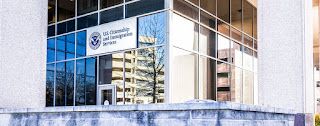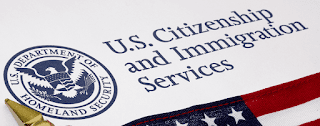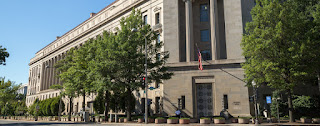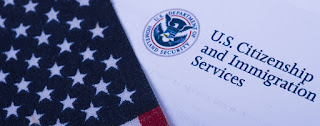We will draw the list of judges and their basic biographical information from the EOIR's articles for October 9 [link] and December 18 [link].
Abbreviations Used in this Article
Many of the new immigration judges worked in various capacities for the DHS and DOJ prior to their appointments to the immigration bench. Below, you will find a list of abbreviations that we will use in their biographies, where necessary.
- DOJ = Department of Justice
- DHS = Department of Homeland Security
- ICE = Immigration and Customs Enforcement
- CBP = U.S. Customs and Border Protection
- USCIS = U.S. Citizenship and Immigration Services
- OCC = Office of Chief Counsel
- OPLA = Office of Principal Legal Advisor
Immigration Courts Welcoming New Judges
Below, you will find the full list of immigration courts that welcomed new immigration judges in the October 9 and December 18 announcements. We will indicate in a parenthetical the courts that received multiple new immigration judges. We will use square brackets to indicate the state each immigration court is located in.
The three immigration court locations in Manhattan — Broadway, Federal Plaza, and Varick Street, received 10 new immigration judges combined between the October and December announcements.
- Adelanto Immigration Court [CA]
- Atlanta — W. Peachtree Street Immigration Court [GA]
- Batavia Immigration Court [NY]
- Chicago Immigration Court [IL]
- Cleveland Immigration Court [OH]
- Dallas Immigration Court [TX]
- El Paso Immigration Court [TX]
- Falls Church Immigration Adjudication Center [VA]
- Fort Worth Immigration Adjudication Center [TX]
- Harlingen Immigration Court [TX]
- Houston Immigration Court [TX] (2)
- Houston — S. Gessner Road Immigration Court [TX]
- Imperial Immigration Court [CA]
- Los Angeles — Olive Immigration Court [CA]
- New York — Broadway Immigration Court [NY] (7)
- New York — Federal Plaza Immigration Court [NY]
- New York — Varick Immigration Court [NY] (2)
- Otay Mesa Immigration Court [CA] (2)
- Otero Immigration Court [NM]
- Philadelphia Immigration Court [PA]
- Port Isabel Immigration Court [TX]
- San Antonio Immigration Court [TX]
- San Francisco Immigration Court [CA] (2)
- Seattle Immigration Court [WA]
New Judge for Adelanto Immigration Court
Immigration Judge Ravit R. Halperin (December Investiture)
- 2000-2020: Private practice (2008-2020 as the founder of an immigration law firm)
- 1992: Earned J.D. from the City University of New York Law School
New Judge for the Atlanta — W. Peachtree Street Immigration Court
Immigration Judge Blake L. Doughty (October Investiture)
- 2019-2020: Deputy chief counsel, OCC, OPLA, ICE, DHS in Atlanta, Georgia
- 2015-2019: Assistant chief counsel, OCC, OPLA, ICE, DHS in Atlanta and Lumpkin, Georgia
- 2014-2014: Local prosecutor
- 2009-2014: U.S. Army judge advocate
- 2008: Earned J.D. from Roger Williams University School of Law
New Judge for the Batavia Immigration Court
Immigration Judge Robert P. Driscoll (October Investiture)
- 1998-2020: Local prosecutor in Athens, Ohio
- 1993-1998: Private practice
- 1993: Earned J.D. from Capital University Law School
New Judge for the Chicago Immigration Court
Immigration Judge Brendan Curran (October Investiture)
- 2007-2020: Assistant chief counsel, OCC, OPLA, ICE, DHS in Chicago, Illinois
- 1999-2007: Local prosecutor in Cook County, Illinois
- 1994-1999: Served as an officer in the Judge Advocate General's Corps of the U.S. Navy
- 1994: Earned J.D. from DePaul University College of Law
New Judge for the Cleveland Immigration Court
Immigration Judge Donald Pashayan (December Investiture)
- 2012-2020: Assistant U.S. attorney in the Organized Crime Drug Enforcement Task Force of the District of Arizona
- 2003-2012: Assistant U.S. attorney in the Southern District of Ohio and in the Middle District of Florida
- 2002-2002: Private practice
- 1999-2002: Judge advocate in the U.S. Navy
- 1999: Earned J.D. from the Cleveland-Marshall College of Law
- 1994-1999: Police officer
New Judge for the Dallas Immigration Court
Immigration Judge Glen R. Hines
- 1997-Present: Judge advocate in the U.S. Marine Corps
- 2018-2020: Civilian legal counsel and policy advisor for the U.S. Department of Defense
- 2014-2018: Circuit military judge
- 2012-2014: Assistant U.S. attorney for the Western District of Arkansas
- 2005: Earned Master of Laws degree from the George Washington University School of Law
- 1994: Earned J.D. from the University of Arkansas
New Judge for the El Paso Immigration Court
Immigration Judge James J. Miller Jr.
- 1998-2020: Chief assistant U.S. Attorney for the U.S. Attorney's Office, Western District of Texas, Pecos Division, in Alpine, Texas
- 1994-1998: Senior Defense Counsel, Trial Defense Service, U.S. Army Judge Advocate General Corps
- 1990-1994: Attorney and prosecutor with the U.S. Army Judge Advocate General Corps
- Earned J.D. from Hamline University School of Law
New Judge for the Falls Church Immigration Adjudication Center
Immigration Judge Robert M. Lewandowski (December Investiture)
- 1986-2020: Judge advocate in the U.S. Marine Corps
- 2004-2020: Chief of staff, special assistant and senior advisor, for the U.S. Border Patrol, CBP, DHS, in the District of Columbia
- 1996-1994: Sector counsel for the Laredo, Texas Sector, U.S. Border Patrol, CBP, DHS
- 1989: Earned J.D. from the College of William and Mary
New Judge for the Fort Worth Immigration Adjudication Center
Immigration Judge Randall L. Fulke (October Investiture)
- 1990-2020: Assistant U.S. attorney at the U.S. Attorney's Office for the Eastern District of Texas
- 1988-2018: U.S. Army Reserve, Judge Advocate General's Corps
- 1986-1990: Assistant district attorney for Lubbock and Midland Counties, in Texas
- 1984-1985: Private Practice
- 1984: Earned J.D. from Texas Tech University School of Law
New Judge for the Harlingen Immigration Court
Immigration Judge Mark K. Brooks (December Investiture)
- 2019-2020: Special trial attorney, OPLA, ICE, DHS, in Arlington, Virginia, on detail from USCIS
- 2017-2020: Immigration officer, Fraud Detection National Security Directorate, USCIS, DHS.
- 2012-2016: Private practice
- 2005-2012: Attorney advisor, Office of Chief Counsel, Federal Emergency Management Agency (FEMA), DHS, in the District of Columbia
- 2001-2004: State prosecutor serving in Maryland
- 1986-2001: Private practice
- 1986: Earned J.D. from the Antioch School of Law
Two New Judges for the Houston Immigration Court
Immigration Judge Joshua D. Osbourn (October Investiture)
- 2016-2020: Assistant chief counsel, OCC, OPL, ICE, DHS, in Los Angeles (Adelanto)
- 2009-2016: Local prosecutor in Arizona
- 2008: Earned J.D. from the University of Kansas, School of Law
Immigration Judge Christopher M. Schumann (October Investiture)
- 2000-2020: Attorney and military judge with the U.S. Air Force
- 2005: Earned Master of Laws from the Judge Advocate General's Legal Center and School
- 1999: Earned J.D. from the University of Pittsburgh School of Law
New Judge for the Houston — S. Gessner Road Immigration Court
Immigration Judge DeLana M. Jones (October Investiture)
- 2013-2020: Special assistant U.S. attorney and assistant U.S. attorney in the U.S. Attorney's Office for the Northern District of Georgia
- 2010-2013: Law clerk for U.S. Magistrate Judge Linda T. Walker, Northern District of Georgia, in Atlanta
- 2006-2010: Private practice
- 2006: Earned J.D. from Harvard Law School
New Judge for the Imperial Immigration Court
Immigration Judge Jeffrey V. Muñoz (December Investiture)
- 1995-2020: Active duty in the Marine Corps; including as a criminal defense attorney, prosecutor, general counsel, and military trial judge
- 2003: Earned J.D. from the University of Arizona College of Law
New Judge for the Los Angeles — Olive Immigration Court
Immigration Judge Wilbur Lee (October Investiture)
- 1998-2020: Judge advocate in the U.S. Marine Corps; including service as a military judge
- 2010: Earned Master of Laws from the Judge Advocate General's Legal Center and School
- 1997: Earned J.D. from the Southwestern University School of Law
Seven New Immigration Judges for the Broadway — New York Immigration Court
Immigration Judge Erin L. Alexander (December Investiture)
- 2004-present: U.S. Navy in various active duty and reserve capacities, including as a judge advocate
- 2014-2020: Assistant district attorney in the New York County District Attorney's Office (Manhattan)
- 2012-2014: Private Practice
- 2010: Earned J.D. from Georgetown University Law Center
Immigration Judge John P. Burns (December Investiture)
- 2016-2020: Assistant chief counsel, OPLA, ICE, DHS, in New York
- 2013-present: Officer in the Judge Advocate General's Corps of the New York Army National Guard
- 2010-2016: Attorney at the Social Security Administration
- 2009: Earned J.D. from Fordham University School of Law
Immigration Judge Edward P. Grogan (October Investiture)
- 2000-2020: Assistant U.S. attorney at the U.S. Attorney's Office for the Northern District of New York
- 1994-2020: U.S. army judge advocate general officer
- 1993: Private practice
- 1992: Earned J.D. from Albany Law School
- 1984-1988: Army infantry officer
Immigration Judge Dawn M. Kulick (December Investiture)
- 2016-2020: Assistant chief counsel, OPLA, ICE, DHS, in Miami and Philadelphia
- 2014-2016: Judicial law clerk for U.S. Magistrate Judge Andrea M. Simonton, U.S. District Court for the Southern District of Florida
- Before 2014: Assistant state attorney in the Miami-Dade State Attorney's Office; Private practice
- 2003: Earned J.D. from New York Law School
- 1993-2001: Worked in corporate world, including for a publishing house
Immigration Judge Shirley Lazare-Raphael (December Investiture)
- 2019-2020: Assistant chief counsel, OPLA, ICE, DHS, in New York
- 2001-2019: Private practice
- 2000: Earned J.D. from Brooklyn Law School
Immigration Judge Tanawa Lebreton (October Investiture)
- 2006-2020: Private practice in various positions; including 2017-2020 stint as practice group director with Inland Counties Legal Services, and 2008-2009 stint as staff attorney with Catholic Legal Services
- 2006: Earned J.D. from Ave Maria School of Law
Immigration Judge James R. McKee (October Investiture)
- 2018-2020: Chief, Foreign Law Branch, Department of Defense, in Germany and Florida
- 2016-2018: Served with the September 11th Victim Compensation Fund, DOJ
- 2012: Earned Master of Laws from the Judge Advocate General's Legal Center and School
- 1994-2016: U.S. Army judge advocate in multiple positions
- 1989-2013: Enlisted infantry soldier in the New York Army National Guard
- 1991-1993: Clerk for the 60th Judicial District Court of Common Please, in Pike County, Pennsylvania
- 1991: Earned J.D. from the Syracuse University School of Law
New Judge for the New York — Federal Plaza Immigration Court
Immigration Judge Maria T. Ubarri (December Investiture)
- 2010-2020: State trial court judge in Puerto Rico
- 1995-2010: Private practice
- 1994-1995: Policy advisor to the Governor of Puerto Rico
- 1993: Legislative assistant for the Resident Commissioner of Puerto Rico, U.S. House of Representatives
- 1991: Earned J.D. from the University of Puerto Rico Law School
Two New Judges for the New York — Varick Street Immigration Court
Immigration Judge Richard H. Drucker (December Investiture)
- 1981-2020: Private practice in Cleveland, Ohio
- 1981: Earned J.D. from Cleveland State University
Immigration Judge Thomas J. Mungoven (October Investiture)
- 2004-2020: Private practice; including 2004-2008 stint as staff attorney at Catholic Charities of the Archdiocese of Newark Immigrant and Refugee Services Division
- 2004: Earned J.D. from Saint John's University School of Law
Two New Judges for the Otay Mesa Immigration Court
Assistant Chief Immigration Judge Colleen M. Glaser-Allen (October Investiture)
- 2018-2020: Chief trial judge of the Navy-Marine Corps Trial Judiciary
- 2016-2018: Served at the Navy-Marine Corps Court of Criminal Appeals, including from 2017-2018 as chief appellate judge
- 1995-2020: Active duty judge advocate in the U.S. Navy-Marine Corps
- 2007: Earned Master of Laws from the George Washington University Law School
- 1995: Earned J.D. from the University of Illinois College of Law at Urbana-Champaign
Immigration Judge Samantha L. Begovich (December Investiture)
- 1996-2020: Deputy district attorney for the Office of the District Attorney, San Diego, California
- 1994-1996: Trial attorney for the Civil Rights Division, Criminal Section, Department of Justice
- 1994: Special assistant U.S. attorney at the U.S. Attorney's Office for the District of Columbia
- 1994: Earned J.D. from Stanford Law School
New Judge for the Otero Immigration Court
Immigration Judge Ralph E. Girvin Jr. (October Investiture)
- 2018-2020: Assistant chief counsel, OCC, OPLA, ICE, DHS in El Paso, Texas
- 2016-2018: Assistant U.S. attorney for the Western District of Texas
- 2000-2016: Assistant attorney and chief of the Civil and Criminal Divisions, for the County of El Paso, Texas
- 1996-1999: Assistant district attorney for the 34th Judicial District of Texas
- 1995: Earned J.D. from St. Mary's University School of Law
- 1986-1992: Served in the U.S. Army Reserve and Texas Army National Guard
New Judge for the Philadelphia Immigration Court
Immigration Judge Patrick J. Ehlers (October Investiture)
- 2015-2020: Assistant U.S. attorney in Portland, Oregon; also resident legal advisor for the DOJ's Office of Overseas Prosecutorial Development
- 1998-2015: Assistant federal public defender in Portland, Oregon and previously in various locations in Oklahoma
- 1996-1998: Public defender in Oklahoma
- 1995-1996: Judicial assistant to judge for the Oklahoma Court of Criminal Appeals
- 1993-1995: Post-conviction defense counsel for the Oklahoma Indigent Defense System
- 1993: Earned J.D. from the University of Oklahoma College of Law
New Judge for the Port Isabel Immigration Court
Immigration Judge Jefferson B. Brown (October Investiture)
- 1994-2020: Chief circuit trial judge, deputy circuit trial judge, appellate judge, trial judge, staff judge advocate, deputy staff judge advocate, appellate defense counsel, trial defense counsel, and prosecutor for the U.S. Air Force; retired with rank of colonel
- 1993: Earned J.D. from Vanderbilt Law School
New Judge for the San Antonio Immigration Court
Assistant Chief Immigration Judge Charles P. Koutras (October Investiture)
- 1997-present: Judge advocate for the U.S. Navy in active and reserve capacities
- 2006-2020: Attorney for U.S. Army South at Fort Sam Houston, Texas
- 2002-2004: Assistant city attorney for San Antonio, Texas
- 1997: Earned J.D. from St. Mary's University
Two New Immigration Judges for the San Francisco Immigration Court
Immigration Judge Samuel Y. Kim (December Investiture)
- 2018-2020: Private practice in San Francisco, California
- 2014-2018: Assistant chief counsel, OPLA, ICE, DHS, in San Francisco, California
- 2013-2014: Private practice in San Francisco, California
- 2011-2013: Assistant chief counsel, OPLA, ICE, DHS, in Los Angeles, California
- 2006-2011: Active duty as a judge advocate for the Marine Corps Forces Reserve
- 2004-2005: Private practice
- 2004: Earned J.D. from Washington University in Saint Louis School of Law
Immigration Judge Jason R. Masterson (December Investiture)
- 2011-2020: Active duty judge advocate in the U.S. Navy
- 2011-2013: Prosecutor and special assistant U.S. Attorney for the Southern District of California
- 2010: Earned J.D. from the University of Cincinnati College of Law
- 2009-2010: Cincinnati Prosecutor's office
- 2008-2009: Fellow with the Ohio Innocence Project
- 2004-2007: Substance abuse and mental illness case manager for non-profit
New Judge for the Seattle Immigration Court
Immigration Judge Hayden Windrow
- 2020: Trial attorney, District Court Section, Office of Immigration Litigation, DOJ
- 2015-2020: Assistant chief counsel, OPLA, ICE, DHS, in New York
- 2005-2015: Judicial law clerk at multiple Article III Courts
- 2005: Earned J.D. from New York University School of Law









